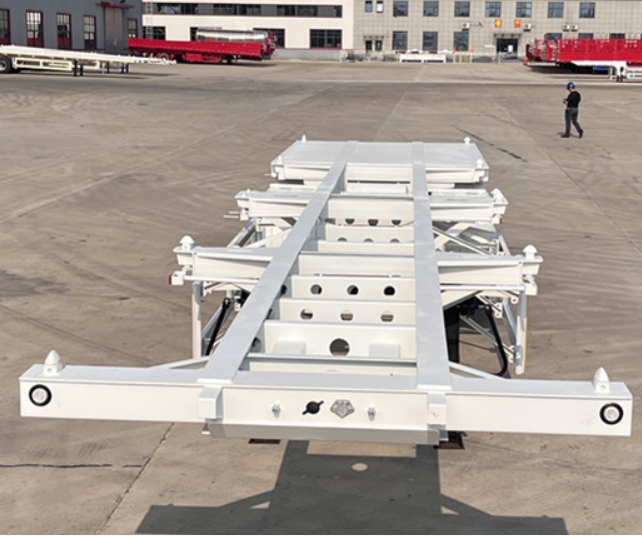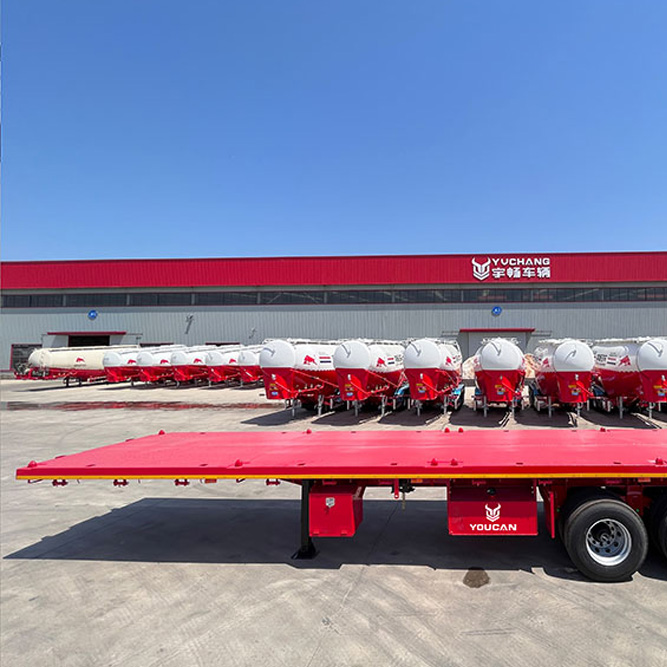Bulk Cement Trailer: A Comprehensive Introduction
Bulk cement trailers are indispensable when it comes to transporting large amounts of cement and other powdered materials. This comprehensive guide is designed to give you in-depth insights into the various aspects of bulk cement trailers, such as their structure, advantages, varieties, and more.
1. What Is a Bulk Cement Trailer?
A bulk cement trailer is a specialized kind of semi-trailer designed explicitly for the transportation and unloading of vast amounts of cement and other powdered materials. The trailer features an enclosed, high-capacity tank, which enables efficient storage and handling of the materials. By using a specialized trailer, both the safety of the cargo and its swift and easy unloading at the destination are ensured.
2. Key Structural Features of Bulk Cement Trailers
The typical bulk cement trailer is comprised of a sturdy frame, an enclosed tank, and a pneumatic discharging system. Constructed using high-quality steel or aluminum materials, the tank is designed to ensure the durability and longevity of the trailer. The pneumatic discharging system, or air compressor, enables the secure unloading of the bulk materials by utilizing pressurized air to propel the load.
Additional structural features may include a filtration system, pressure safety valves, aeration pads, catwalks, and hose carriers, providing improved safety and convenience for the operators.
3. The Importance of Using a Bulk Cement Trailer
Utilizing a bulk cement trailer results in several benefits for transporting large quantities of cement, including:
Significant reductions in transportation costs, as the need for multiple bags or smaller containers is eliminated.
Prevention of cargo contamination and product loss by ensuring the safe and secure transport of the materials.
Faster and more efficient loading and unloading processes, increasing overall productivity.
4. A Closer Look at the Types of Bulk Cement Trailers
There are several different types of bulk cement trailers designed to cater to specific transportation demands:
V-Type Bulk Cement Trailer: The V-Type features a V-shaped tank design, which provides enhanced stability during transportation and leaves minimal residue after unloading.
W-Type Bulk Cement Trailer: With a similar concept to the V-Type, the W-Type design offers excellent stability and residue management, improving overall operational efficiency.
Banana-Type Bulk Cement Trailer: The tank of this trailer is banana-shaped, providing improved aerodynamics and, thus, increased fuel efficiency during transportation.
Some bulk cement trailers are also designed for specific materials, such as fly ash, flour, or other granulated products. These specialized trailers often feature dedicated filters and aeration systems to enhance product quality.
5. Understanding the Dimensions and Capacities of Container Bulk Cement Trailers
Although dimensions can vary based on the specific design, most bulk cement trailers have a tank capacity ranging from 35 to 100 cubic meters, with the ability to accommodate between 40 and 60 tons of cement.
The overall dimensions (length, width, height) tend to average around 12 to 13 meters, 2.5 meters, and 3.9 to 4 meters, respectively. However, custom designs are available to meet unique transportation requirements.
6. Key Advantages of Using a Bulk Cement Trailer
Employing a bulk cement trailer provides numerous advantages, such as:
Enhanced transport efficiency leading to substantial cost savings.
Improved safety measures and cargo protection during transit.
More straightforward and faster processes for loading and unloading.
Minimization of product loss and contamination risks.
7. Essential Precautions for Operating a Bulk Cement Trailer
To ensure safe and effective use, follow essential precautions when operating a bulk cement trailer:
Ensure that the trailer is in excellent working condition and well-maintained.
Confirm proper weight distribution to minimize the risk of accidents during transportation.
Adhere to the manufacturer's guidelines when using the air compressor and pneumatic system.
Conduct regular inspections and cleaning of the trailer to prevent product buildup and contamination.
8. The Costs and Economies of a Bulk Cement Trailer
The cost of a bulk cement trailer can significantly influence the overall expenses and efficiency of your transportation operations. Understanding the factors that contribute to the trailer's price, as well as the economies offered, can help you make informed decisions when purchasing a bulk cement trailer.
Initial Investment: The price of a new bulk cement trailer typically ranges from 20,000 USD to 60,000 USD depending on various factors such as tank capacity, construction materials (aluminum or steel), design (V-Type, W-Type, Banana-Type), added features, and customization options.
Maintenance and Repair Costs: Regular maintenance is vital to ensure the longevity and performance of a bulk cement trailer. Costs can include routine inspections, replacement of worn parts, and cleaning the trailer to prevent product buildup and contamination. These expenses can vary based on usage, age, and the quality of the trailer.
Operational Costs: Fuel expenses, insurance premiums, tires, and other operating costs should also be considered when evaluating the economies of a bulk cement trailer. An aerodynamic and fuel-efficient design can lead to substantial savings on fuel.
Enhanced Efficiency: Bulk cement trailers offer improved transportation efficiency by reducing the need for multiple bags or smaller containers, faster loading and unloading processes, and better protection of the cargo. This higher efficiency can result in significant cost savings in the long run.
Depreciation and Resale Value: Like any other specialized equipment, bulk cement trailers depreciate over time. However, a well-maintained trailer can still hold a considerable resale value. It's crucial to factor in the depreciation and potential resale value when assessing the overall economies of owning a bulk cement trailer.
By considering these factors and their associated costs, you can better understand the economies of owning and operating a bulk cement trailer and make sound decisions regarding your investment in these specialized transportation vehicles.
9.Bulk Cement Trailer manufacturer
Youcan Trailer is a renowned professional manufacturer of Bulk Cement Trailers, dedicated to providing high-quality and reliable trailers for the transportation of bulk cement and other powdered materials. With years of experience and expertise, Youcan Trailer offers a wide range of designs and capacities to meet your specific needs. Their commitment to quality, innovation, and customer satisfaction makes them the go-to choice for all your bulk cement trailer requirements.
10. Frequently Asked Questions
Q1: How do I maintain a bulk cement trailer?
A: Regular maintenance includes inspecting the tank, frame, and pneumatic system; ensuring proper lubrication of moving parts; and keeping the trailer clean and free from residue.
Q2: Can a bulk cement trailer transport other powdered materials?
A: Yes, bulk cement trailers can transport a variety of powdered materials, such as limestone, fly ash, and flour. However, it's crucial to ensure compatibility with the specific trailer and the required cleanliness standards.
Q3: How is the cement unloaded from the trailer?
A: The cement is unloaded using the pneumatic discharging system, which employs pressurized air to move the bulk material from the tank to the delivery site's storage facilities.
Q4: What factors influence the cost of a bulk cement trailer?
A: Factors such as tank capacity, materials used (steel or aluminum), design, and additional features like advanced pneumatic systems and accessories can influence the price of a bulk cement trailer.
Q5: How do I choose the right capacity for my bulk cement trailer?
A: Assess your transportation needs, including the expected cargo weight, the frequency of shipments, and route conditions, to select the appropriate capacity for your bulk cement trailer.
Q6: Can a bulk cement trailer handle wet or damp conditions?
A: While bulk cement trailers are designed to keep powdered materials dry, it's essential to take precautions and ensure proper sealing and maintenance to prevent moisture ingress during transport and loading/unloading operations.
Q7: What are the key safety considerations when operating a bulk cement trailer?
A: Key safety considerations include checking the weight distribution, adhering to proper loading/unloading procedures, using personal protective equipment, and following the manufacturer's guidelines for operation and maintenance.
Q8: How can I improve the fuel efficiency of my bulk cement trailer?
A: Choosing a trailer with an aerodynamic design, maintaining the pneumatic system and tires in good condition, and avoiding overloading the trailer are some ways to improve fuel efficiency.

 WhatsApp
WhatsApp
 sales@youcantrailer.com
sales@youcantrailer.com
 +8615203709888
+8615203709888


